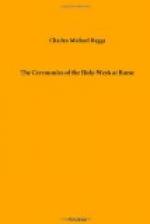[Footnote 10: Because anciently sung from the steps of the ambo or pulpit, according to Rabanus Maurus an author of the 9th century, and others. In the ancient churches there were generally in the chorus or choir two ambones, one from which at solemn masses the lector and at a later period the subdeacon used to sing the gospel, with his face usually turned towards that side of the church, where the men were assembled; at Rome this was generally the south side. At low masses the missal was removed from the epistle side of the altar at the beginning of the offertory, in order to leave room for the offerings, according to an Ordinarium of Monte Casino of the year 1100. It has for a long time been customary to remove it before the gospel, which the priest recites turned towards the same direction as the deacon at high mass. Mystical meanings were afterwards assigned for this removal of the book.]
[Footnote 11: It is astonishing how Mr. Palmer could assert that “Leo bishop of Rome in the fifth century appears to have been the only bishop who preached in the Roman church for many Footnote: and it is said that none of his successors until the time of Pius the fifth, five hundred years afterwards, imitated his example”. Orig. Liturg. vol. II, p. 59. Bingham I. IV, c. Sec..3. Mr. Palmer forgot all the homilies of Gregory the great, as well as the chronology of the Popes. The latter might find in the multiplicity and importance of their other occupations abundant motives for abstaining from preaching, a duty to which so many of their clergy dedicate themselves. That the early Popes however preached there can be no doubt, although most of their homilies, if ever written, have not reached our time. Not only the example of S. Peter who (whatever we may think of the local tradition of Rocca S. Pietro above Palestrina) used certainly to preach, as the Acts of the Apostles prove; but the general custom of other cities would induce the zealous Bishops of Rome to exhort and encourage their flock, particularly in time of persecution; and that at a later period they were not unaccustomed to preach is evident from the Ordo Romanus of Card. Gaetano published by Mabillon and from a Vatican MS. no. 4231, p. 197; both these documents are quoted by Cancellieri, Descriz. delle Cappelle etc. p. 328. See proofs that the Popes preached drawn up in chronological order in Sala’s notes to Card. Bona, lib. 2. c. 7-]
[Footnote 12: S. Ambros. Ep. 13, serm. 34.]
[Footnote 13: Of the ancient offerings the following vestiges remain: candles are offered by the clergy at their ordination, bread and wine by bishops at their consecration, chalices and torches by the Roman senate on particular festivals, and in fine bread, wine, water, and, till lately, doves and other birds at the canonisation of the Saints. On the ancient offerings see Cancellieri, de Secretaries, t. I, p. 181.]
[Footnote 14: “This custom prevailed universally in the Christian church from the earliest period” Palmer Orig. Liturg. vol. 2, p. 75.]




